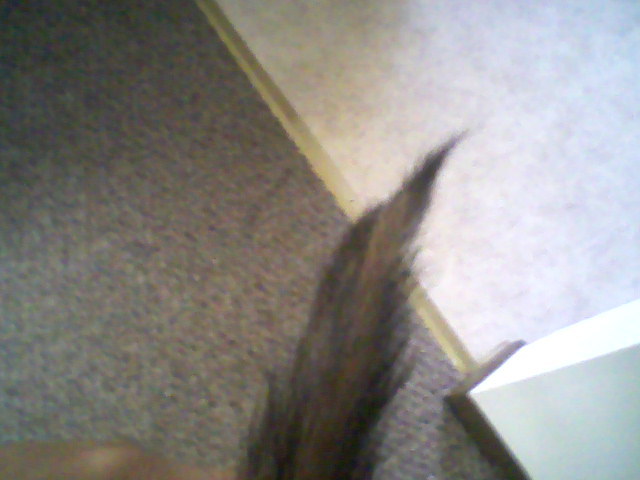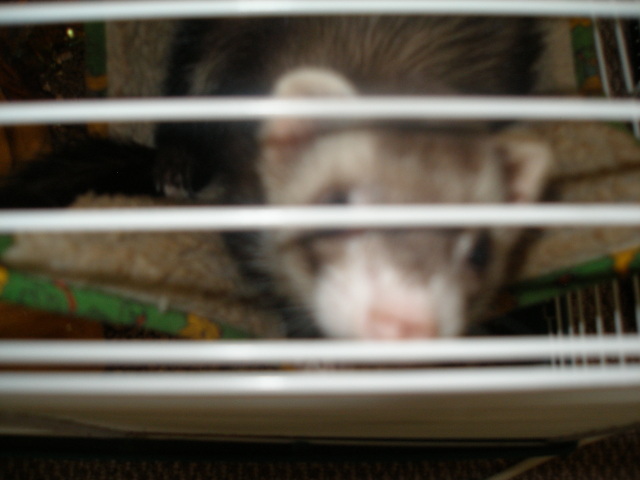Question
--I live in Byars, ok and would really like to know if there is a vet that specializes in ferrets in my area? Thanks again ,Kay-----------------------------------------
The text above is a follow-up to ...
-----Question-----
How much do you feed them and when do you give them their rabies shot? Also what kind of shampoo do you use for their bath? Thank you, Kay
-----Answer-----
Hi Kay:
Congratulations on your new ferret! As far as feeding goes, ferrets need to have dry kibble food and fresh water available to them 24 hours a day. They won't overeat, so you don't have to worry about that. Ferrets have a very short digestive tract, so they need to eat at least every few hours. It's just best to let them 'free feed' (keep kibble in the bowl all the time). Ferrets are "obligate carnivores", so it's really important that they have a ferret-specific food that is high in protein from a MEAT source. Many owners combine two or more high quality foods, as ferrets "imprint" on their food at an early age and it can be difficult if a company changes their recipe, etc. It takes ferrets a while to recognize the new food as something to eat. I personally prefer quality foods such as Totally Ferret, 8 in 1 Ultimate (the only 8 in 1 product that meets ferret's nutritional needs), Path Valley Foods kibble, Marshall Farms food (tends to make their poops stinky because it has fish as a protein source, but is okay as far as a food goes). Other foods that are high quality, but not as readily acceptable (yummy) as other foods are Zupreem, Mazuri,and Sheppard and Greene. You can find a list of all foods for ferrets here:
http://www.ferretstore.com/ferfoodcomch.html
The best way to choose foods for your ferret is to look at the FIRST FIVE INGREDIENTS.....FOUR OF THE FIRST FIVE should be MEAT ingredients of some kind. An excellent ferret food may read something like this: "chicken, chicken byproducts, chicken digest, chicken broth, brown rice.....", whereas a food that is NOT good would read more like this: "chicken, corn meal, rice, soybean, chicken broth..." If you stick to the "four out of five meat protein sources" rule, you will be fine. Don't be fooled by foods that are artificially high in protein by using products such as soybean (which is a fine protein for people, but not for ferrets, as their systems only digest and use meat and meat byproducts and soybean is a vegetable protein). They need a minimum of 34% protein in their dry kibble, so that is another thing to watch for. Read those labels and your ferret will have a longer, healthier life for it!
If you got your ferrets from a pet store, they have already received the first of three distemper shots they need. By the time you receive your ferret, they are probably due for their second distemper shot (DISTEMPER shots are given at 8, ll, and 14 weeks) Be sure the vaccine they get is "Fervac D" or "Galaxy D". Your ferrets will then need yearly vaccinations to stay protected. Distemper is very contagious and can even be carried into your home on your shoes, so it's really important that they receive this vaccination regularly, even if they never leave your home.
The other vaccination your ferrets need is a rabies shot. This shot should be given 2-3 weeks before/after the distemper vaccination. The two should NEVER BE GIVEN TOGETHER. This increases the chance of a reaction and reactions are often fatal (they are horrible to witness!).
To safeguard your ferret, be sure your vet gives your ferret a shot of benadryl approximately 15-30 minutes BEFORE giving distemper OR rabies vaccinations. This will help to lessen the chance of a reaction, but it's not a guarantee. You need to stay at your vet's office for about 20-30 minutes after any vaccination, just to be sure they aren't going to have reactions.
My own ferret had a reaction to a distemper shot several years ago, even tho she had a pre-treatment with benadryl. Within seconds of receiving the vaccination, her eyes rolled back in her head, blood shot out of her nose, mouth and anus, and she began to have seizures. Fortunately we were still standing right in front of the vet. During the next three hours, my ferret's heart stopped twice, but the vet gave her shots of medication directly into her heart and held oxygen on her face, and gave her 'mini' cpr, which revived her. Also, I was standing right next to her and calling the ferret's name, which turned out to be the difference between life and death, according to my vet. So, IF your ferret ever has a reaction, be sure to stay with them and call to them - they CAN hear you and it helps them come back to you. ONLY do this if you can do it without becoming hysterical....that's why I've told you the details, so you will know what to expect and hopefully won't panic. I don't know that anyone who loves their ferret could keep from 'panicking', but at least you need to know to try to keep your upset in check, or you won't be of any help. Hopefully knowing that even when you *think* they are going to die, if you made sure they had a benadryl shot before the vaccination, and if you have a really good ferret vet, and your ferret hears your voice calling them, you will be giving your ferret the best chance possible of living thru a reaction. Reactions aren't unusual, unfortunately - but you will now be prepared just in case it does ever happen to your ferret.
About bathing - ferrets only need a bath every few months (or if they step in poopies or something, they can get 'area baths' for the dirty areas. Actually, the more you bathe your ferret, the more oils their body tends to secrete, so the fewer baths you give, the better. The best way to keep the odor down on your ferret is to keep their cage really clean by wiping it down daily with a watered-down pinesol in a spray bottle (or other cleaner - Nature's Miracle is wonderful for cage cleaning); change their bedding and blankies at least twice a week because they hold a LOT of odor. Wash their toys often - make sure everything is dry before allowing the ferrets back in the cage (after wiping cage floors down, etc). Hopefully you have floors that are easily cleaned - wire floors are hard on little ferret feet and can even cause them to become deformed, so they need solid flooring in the cage. This makes it a lot easier to wipe down daily also.
When you do bathe your ferrets, Marshall's makes a ferret shampoo, but you can save a lot of money and just use Johnson & Johnsons baby shampoo (it won't hurt their eyes, so you can get a good lather all over them). Ferrets have glands just below their eyes and under their ears that secrete odor, so be sure to lather up well in that area.
Also, good for your ferret and a good way to keep ferret odor down, be sure to clean their ears at least once a month. To do this, scruff the ferret (hold them firmly by the skin on the back of their neck) and dip a Q-tip into baby oil, then wipe the inside of the ear. You can wipe all the outside areas, and you can go straight down just inside the ear, roll the Q-tip, and 'scoop' out the contents. You can go down fairly deeply, as you can't damage their ear unless you're really shoving it in hard. The inner workings of a ferrets ear are actually in an "L" shape and you can't get the Q-tip into the bottom part of the "L" as long as you go straight down and just twirl the Q-tip. Always be sure to use a lot of baby oil, as a dry Q-tip is a bit painful. When finished, you can gently wipe excess oil away with a dry Q-tip.
When you clean their ears, if you get something that looks like black coffee grounds come out, your ferret likely has ear mites and will need to see the vet for a series of two shots given two weeks apart that will get rid of them. Your ferret will also be scratching his ears a lot if he has ear mites. A ferret who doesn't have ear mites will rarely scratch. Whenever someone complains of having an 'itchy' ferret, ear mites is one thing that can cause this, so be sure your vet takes a look in those ears and looks microscopically if he can get anything out of the ear. Ferrets ear wax is typically brownish, so sometimes it takes a microscopic exam to find ear mites.
Best of luck with your new little ones. If I could, I would like to recommend several online websites that have a lot of information about ferrets. The more you know, the longer and healthier lives your ferrets will enjoy. Here are some websites:
http://www.ferretcentral.org
http://www.ferret-universe.org
http://www.miamiferret.org
Also, there is a GREAT book called "FERRETS FOR DUMMIES" by Kim Schilling that has just about everything a new ferret owner needs to know. Read it and YOU will be an expert! :-) That's good news for your ferret and for you - knowing how to properly ferretproof your home, etc, will save you a lot of vet bills. Choosing the proper vet, one who specializes in ferrets or "exotics" will also help your ferret have a longer and healthier life - not all vets are good with ferrets, they are a specialty all their own. If you have any doubts about a vet in your area, if you will write with your city and state, I'll be happy to get some recommendations in your area for you.
Hope that helps answer some of your questions. There is SO much a new owner needs to learn! I haven't even touched on so many topics that are very very important, so I hope you will get really busy and read, read, read. The Ferrets For Dummies book is quite reasonable on http://www.half.com and is really a great resource to have on hand.
Best of luck - and don't hesitate to write again if there is anything I can do to help! Welcome to the wonderful world of ferret ownership!
sincerely,
Jacquie Rodgers
AnswerHi again Kay:
I'm sorry, but I'm not familiar with where Byars, OK is. I am going to give you some links that you can check the lists for cities near you (you must be in a small town?). Anyway, if Byars isn't listed, you will have to go to whatever is closest to you.
Some of these lists are more recent than others, but it never hurts to try a phone number if it's near you and ask if the vet there still does exotics (and be sure your appointment is with the vet who does ferrets); ALSO, if you can't find a vet listed in your area, check the websites where it says "SHELTERS" and do the same thing - search by state, then by city and call one near you and ask them where they take their ferrets. Getting a ferret recommendation from a shelter is always a good idea because they usually know who is best in the closest driving area.
Hope that helps. Hopefully your Oklahoma geography is better than mine (I couldn't even find Byars on a map LOL) Anyway, no doubt you will have more luck, so I shall turn the search over to you. Here are the links for vets and shelters all over the United States, listed by state, then by city - so look for your city or the city closest to you (which may actually be in another state if you live near the border...so don't forget to check that too):
http://www.ferretcentral.org/for-others/db-vets.html
http://www.ferret-universe.com/vets/vetlist.asp
http://www.animalhospitals-usa.com/small_pets/ferrets.html
http://www.everythingferret.com (scroll down to bottom right of page and click on "shelters")
Some vet and shelter listings will be duplicated on websites, but each list should have a few on it that aren't on other lists. That's why I always check all the lists when I do a vet or shelter check.
Best of luck and don't hesitate to write again if I can help in any way.

 Female Behavior Issues
QuestionQUESTION: I have had Ryoko, my female ferret, f
Female Behavior Issues
QuestionQUESTION: I have had Ryoko, my female ferret, f
 ferrets jaw doesnt open far
Question
Rodney and Harry
I have a 2 year old ferret th
ferrets jaw doesnt open far
Question
Rodney and Harry
I have a 2 year old ferret th
 balding tail
QuestionQUESTION: The ferret I am talking about is one
balding tail
QuestionQUESTION: The ferret I am talking about is one
 ferret ear problems
Question
I cant wait to get he
Hi Cindy!
I have a ferre
ferret ear problems
Question
I cant wait to get he
Hi Cindy!
I have a ferre
 ferret losing weight seems listless
Question
mario
Hello my daughters ferret is a neutered
ferret losing weight seems listless
Question
mario
Hello my daughters ferret is a neutered